Want our best Tel Aviv tips and highlights? Tel Aviv makes metropolises like Berlin, Cape Town, or Barcelona look pretty old-fashioned. The Israeli city on the Mediterranean is an ideal travel destination, whether in spring, summer, or winter. From the very first minute, we were speechless and enchanted. We had just strolled through Orthodox and cultural Jerusalem and now we were standing in the middle of colorful, young, and vibrant Tel Aviv.
Here, you can ride longboards along the beach promenade, meet for cocktails on the beach, or play a game of beach volleyball. For us, Tel Aviv is a mix of California and Miami, a mix of lifestyle, serenity, and culture. Today we’ll share with you our best Tel Aviv tips for your trip to Israel.
What else you should know:
- Best time to travel to Israel
- Currency & Money Israel
- Driving in Israel
- Drone flying & Laws
- Entry & Israel Visa
- Safety in the country
- Costs of a trip to Israel
- Reasons for a trip to Israel
- Round trip through Israel
- All about Jerusalem
- What else you should know:
- 1. Arrival & Entry
- 2. Travel time & climate
- 3. Safety in Israel
- 4. Money & finances
- 5. Accommodation in Tel Aviv
- 6. Getting around in Tel Aviv
- 7. Beaches in Tel Aviv
- 8. Markets in the city
- 9. Street art, art & museums
- 10. Tel Aviv tips – sights
- 11. Food and drink
- 12. Tel Aviv tips – tours
- 13. Excursions in the surrounding area
- Our conclusion about Tel Aviv
1. Arrival & entry
Tel Aviv is convenient and can be reached in only 4 – 4.5 hours by plane from Germany. Airlines like Turkish Airlines, Pegasus, Israel Airlines, Easyjet, and Germania will take you there and back for under €200. However, these prices are quite rare and not available from all airports. You can fly from Karlsruhe, Berlin, Nuremberg, Munich, Düsseldorf, Hamburg, and Frankfurt.
The cheaper alternative is the low-cost airline Ryanair. They offer a round-trip flight to Eilat/Ovda (southern Israel) for the incredibly affordable €20 (depending on the month of travel). Here you can find an overview of flights to Eilat from Germany. Generally, most airlines only include one piece of hand luggage in their basic fare. In our opinion, that’s perfectly sufficient for a week.
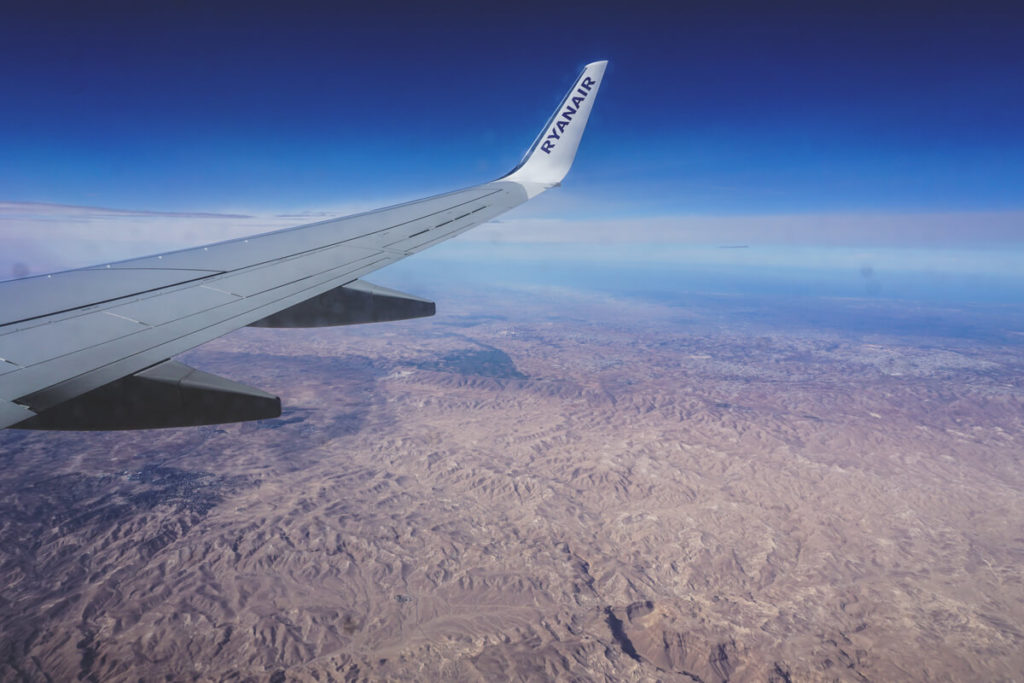
As a German citizen, you don’t need a visa in advance to enter Israel. All you need is a valid passport and some time. There are several checkpoints upon entry and exit, and you’ll be bombarded with questions. If you have stamps from Arab countries in your passport, be prepared for many, many more questions. You won’t get a stamp in your passport; instead, you’ll receive an entry and exit card. This is a good thing, as some countries don’t like seeing an Israeli stamp in their passport. More on this topic here: Entry into Israel & Visa.
2. Travel Time & Climate
You can generally travel to Tel Aviv year-round. The Mediterranean climate brings hot summers and short, humid winters. If winter in Germany gets on your nerves, you can spend a pleasantly warm vacation in Israel. Most of the rain falls between November and March, but generally, there is very little rain compared to other countries. Between May and September, Tel Aviv is extremely dry, and it can happen that it doesn’t rain at all for long periods.
In July, August, and September, temperatures often climb to over 30 degrees Celsius and higher. Perhaps not the best time for sightseeing and adventure. In these hot temperatures, even the simplest activities are often difficult. The only place to cool off is in the pleasant Mediterranean. The best times to travel are in spring, fall, and winter. We were in Israel in December and had great weather every day, with sunshine and temperatures up to 25 degrees Celsius and more. The off-peak months are perfect for a road trip through the country.
3. Safety in Israel
The media usually only shows the worst sides of the country. Reports repeatedly focus on unrest, rocket attacks, deaths, attacks, and clashes. We never felt uncomfortable or unsafe in Israel. Of course, we avoided some danger zones (Gaza, Palestinians, etc.). The people were always friendly and helpful.
Even in Jerusalem, despite Donald Trump’s statements, the situation was calm and relaxed. You can read a detailed article on the topic of security here. You’ll often spot soldiers on the streets. But don’t be surprised that they’re often in civilian clothes, carrying a machine gun loosely over their shoulders. This is simply part of life in Israel and serves security purposes. In general, we highly recommend a trip through Israel.
4. Money & Finance
In Israel, you pay with the Israeli Shekel. Currently, you get around 4 Shekels for 1 €. As always, you can withdraw money with your credit card* at an ATM. Please be aware, however, that fees may apply here and there. There are, of course, exchange offices and banks, but it’s better to withdraw money with a credit card. Price-wise, Israel is similar to Germany, sometimes even a bit more expensive. You can find out how much a round trip through Israel costs here.
5. Accommodation in Tel Aviv
Tel Aviv really has it all! You can stay quite cheaply in a hostel, a hotel, or an Airbnb room. Here in the city, you’ll find some really great hostels, such as the Abraham Hostel, the Beachfront Hostel, or the Florentine Backpacker Hostel. Of course, you can also check into one of the many luxury hotels lined up close together along the beach promenade.
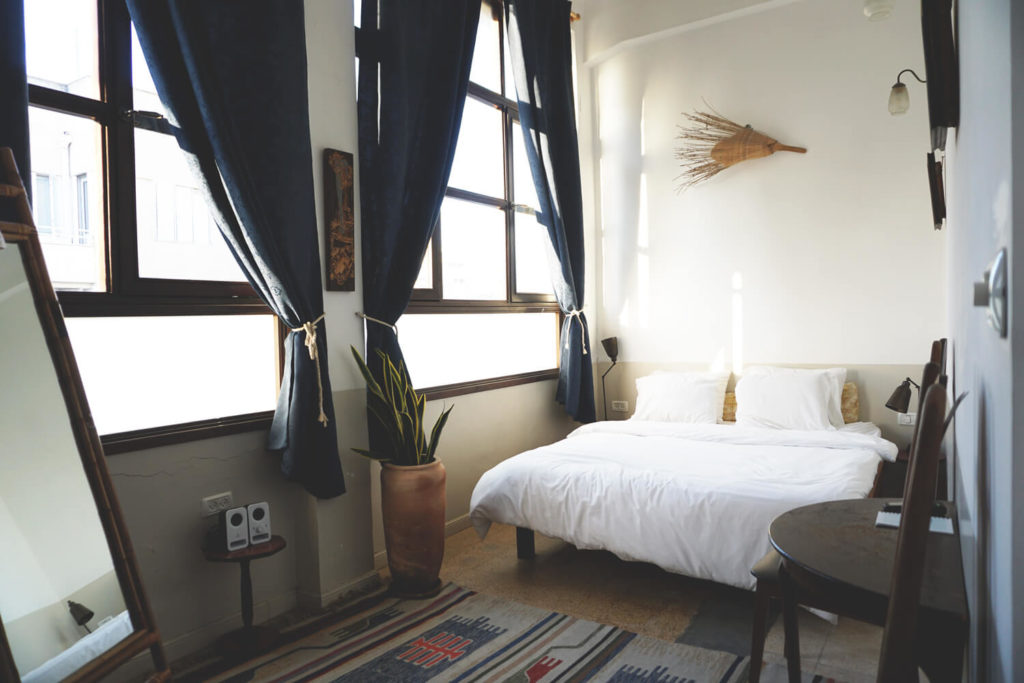
We stayed in a great Airbnb located right near the famous Carmel Market. This apartment has five modern and stylishly furnished rooms, a living room with a balcony, two bathrooms with showers, and an open-plan kitchen/living room. We would stay there again on our next visit to Tel Aviv. We paid around €35 per night. UPDATE 08/2020: Unfortunately, the room is no longer bookable on Airbnb.
- Abraham Hostel*
- Beachfront Hostel*
- Florentine Backpacker Hostel*
- 3* Hotel Gilgal*
- 3* Maxime Design Hotel*
- 4* Prima Tel Aviv Hotel*
6. Getting Around in Tel Aviv
You can explore the city leisurely on foot or rent a bike. You’ll find Tel-O-Fun rental stations with their green bikes on almost every corner. Registration is child’s play and can be done directly at the machine using a credit card. You pay a daily usage fee of €3.90. The first 30 minutes are always free.
The first full hour costs €1.30, 2.5 hours around €7.30, and 4.5 hours around €35. Since you can return your bike virtually anywhere, this mode of transportation is one of the most popular in the city. We cycled leisurely along the beach and through the beautiful Hayarkon Park.
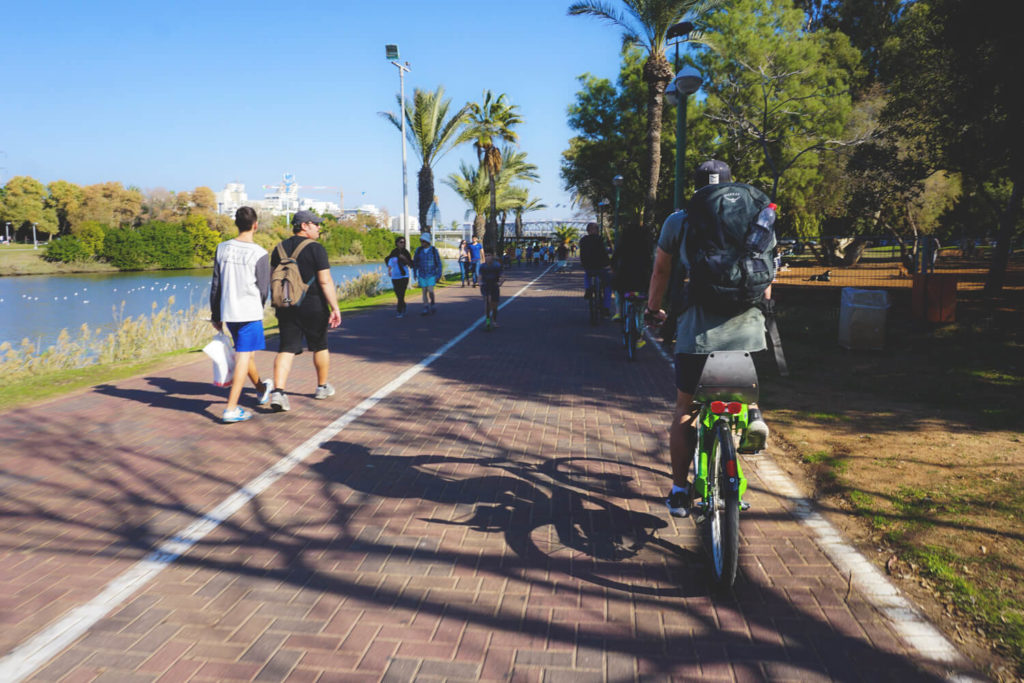
Sheruts are also inexpensive and convenient. These shared taxis travel on certain routes in the city. You simply hop in, sit down, and pay around 7 shekels (€1.60). You don’t need to buy a ticket; the money is simply handed over to the driver. Signal to the driver in good time that you want to get out.
If you’re traveling with a rental car*, remember that you can only park on the side of the road in the entire city using a specific app. Unfortunately, you can only get this app with an Israeli cell phone number. Therefore, parking garages are often the only option, which will cost you around €12.50 to €15 per day. You can find all the information about driving in Israel here. There are also a few smaller parking lots where you can park for 40 ILS (€10) for a day. However, these are usually full.
7. Beaches in Tel Aviv
Tel Aviv has beautiful beaches and a crystal-clear, turquoise sea. We were blown away and hadn’t expected such a beautiful Mediterranean. The light sand lines the Tayelet promenade, stretching approximately 14 kilometers from north to south. In the water, you can watch surfers and kitesurfers, and on the beach, joggers, strollers, yogis, and sunbathers. The 14 kilometers are divided into different sections and each has its own specific names.
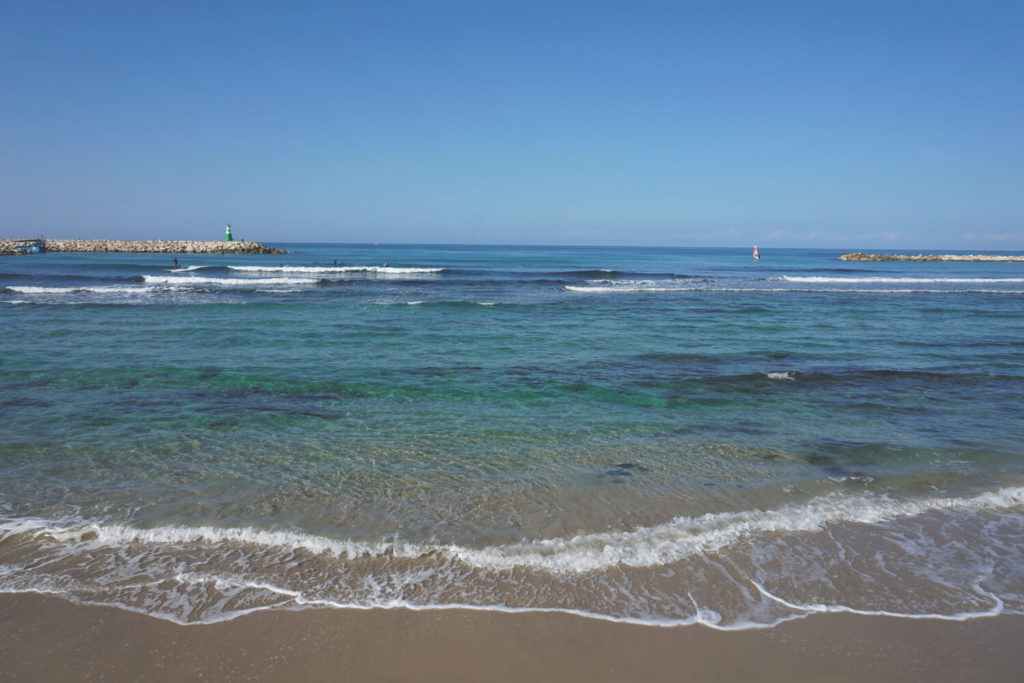
The best section for swimming in the sea is at Hilton Beach. The breakwaters provide excellent protection, allowing you to swim laps in comfort. The Gordon Swimming Pool is fed by cold saltwater from the sea. It has recently been modernized and is located on a wooden deck overlooking the sea. Gordon Beach is beautiful and very clean. It’s crowded with tourists, so the prices in the restaurant and bar are quite high.
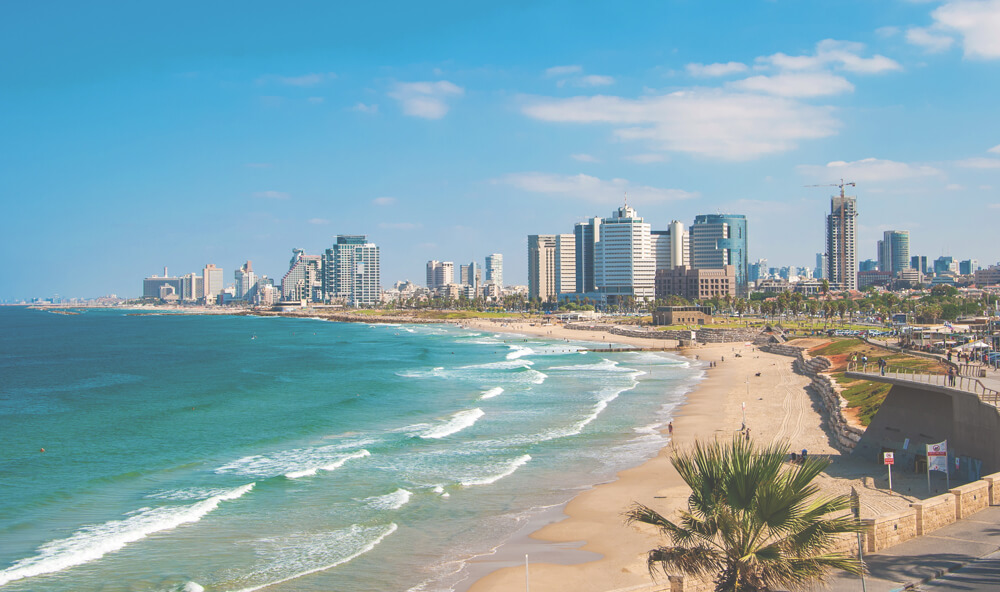
Along the beach promenade, you’ll often find free exercise equipment. Not only Israelis train here, à la Venice Beach/Muscle Beach, but also vacationers and guests. Locals like to go to Frishman Beach, which they have voted the most beautiful beach in Tel Aviv. This beach is located near the US Embassy. Here you can rent loungers and chairs and feast in a café or restaurant behind the beach promenade.
- Surfing: Charles Clore Beach, on the Homat HaYam promenade
- Kiting: Go to the nearby beaches (Bat Yam, etc.)
- Swimming: Possible along almost the entire coast
- Relaxing: You can relax and unwind at any of the beaches
- Stand-up paddling: Providers SupAway and TopSea
8. Markets in the City
The Carmel Market
It all starts at the Carmel Market. Here you’ll find Israel’s culinary diversity. Whether it’s fruit, vegetables, bread, spices, cheese, juices, sweets, hummus, falafel, flatbread, or other pastries—you really don’t need to go anywhere else to eat on this day. Just try everything and let yourself drift from stall to stall. Except Saturdays, the Carmel Market is open every day from 6 a.m. to 6 p.m. You’ll find the market on Carmel Street, between Magen David Square and Allenby Street.
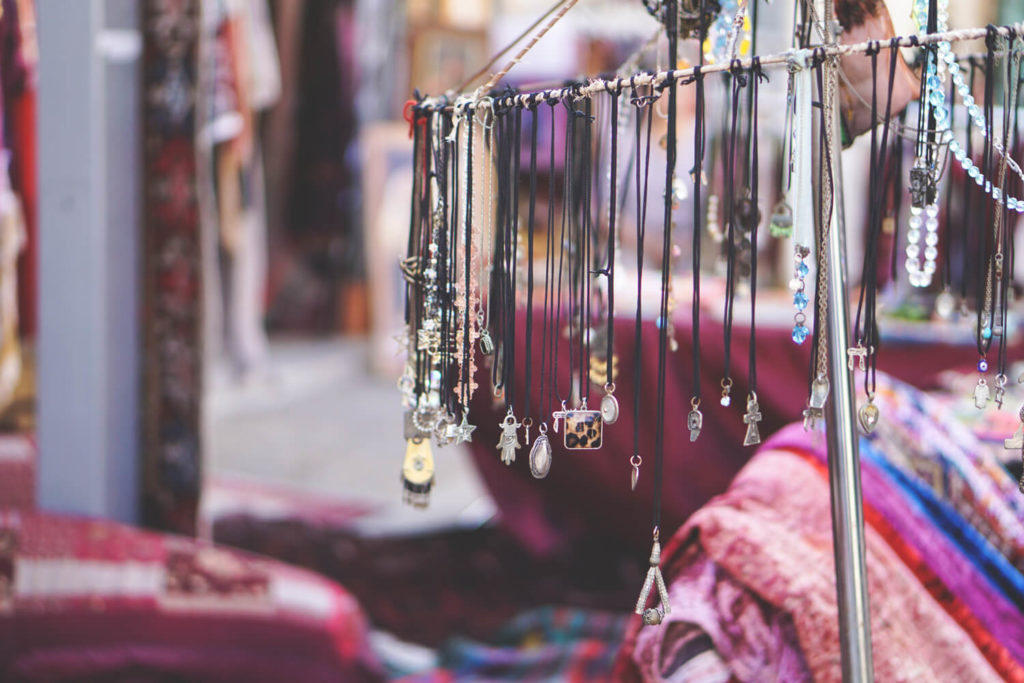
The Jaffa Flea Market
You shouldn’t miss the Jaffa Flea Market either. This huge flea market is a real adventure. For over 100 years, people have been competing to trade secondhand goods here. Here in Jaffa’s Old City, however, you have to be careful not to get completely lost. There’s something going on in every alley and street. Countless craft businesses, antique dealers, and artists offer their wares.
You can also enjoy delicious food and listen to street musicians here. The market is open every day except Saturdays from 9 a.m. to 5 p.m. On Fridays, the shops and stalls close around 2 p.m. We thought it was really cool there, even though it’s very touristy.
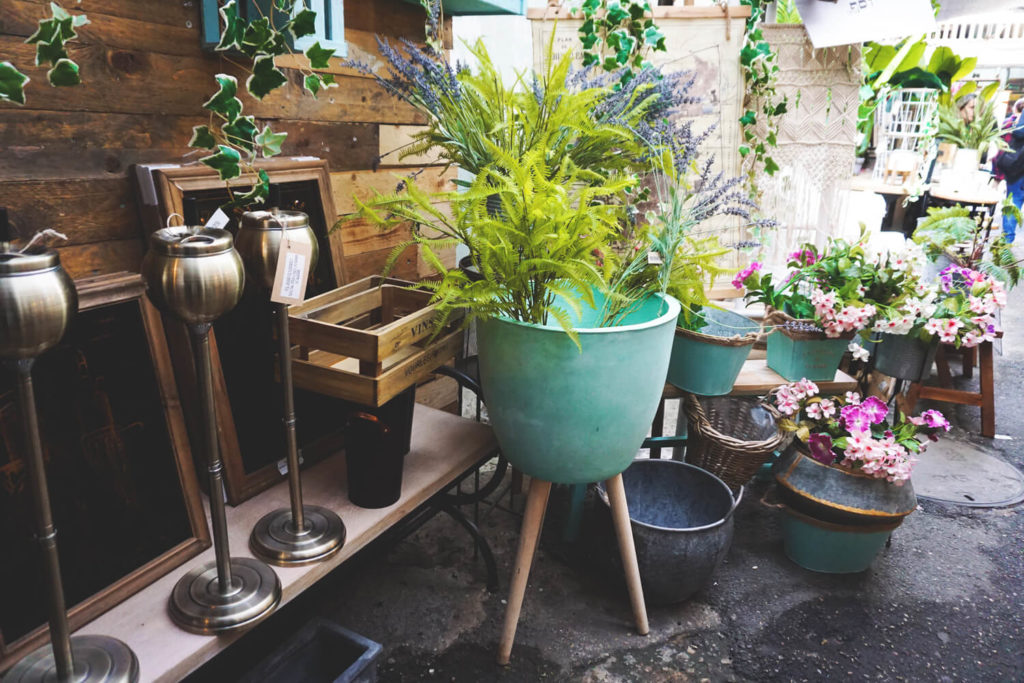
If you have more time, you should also check out the Lewinsky Market. It’s located on Lewinsky Street, between HaAliya and HaMashbir Streets. There are no stalls here, but rather actual shops. They mainly sell oriental spices, nuts, dried fruit, and much more.
On Nahalat Street you’ll find crazy, funny, beautiful, and kitschy items. Artists primarily exhibit their wares here. Whether jewelry, accessories, toys, or handmade products – you can find a unique item or two here. Nahalat Binyamin Street also offers many cafés and bars, perfect for a break after strolling and shopping. The handicraft market is open Tuesday to Friday from 10 a.m. to 6 p.m. (until 7 p.m. in summer, only until 4:30 p.m. in winter).
9. Street Art, Art & Museums
Tel Aviv is full of art, street art, and museums. In some corners, you feel like you’re in Paris, Berlin, New York, or even London. The city is barely 100 years old, but it’s bursting with art and architecture. Whether it’s street art, modern art, history, or specialized knowledge—there’s plenty to discover in Tel Aviv.
We thought the colorful house facades in the Florentin district were really cool; you can find some really great graffiti there. You can easily do your own street art tour. Grab the information and maps from the “Tourist Israel website” and get going. As mentioned above, you’ll find many pictures in Florentin, but also at Jaffa Port or in the Beit Ha’am neighborhood.
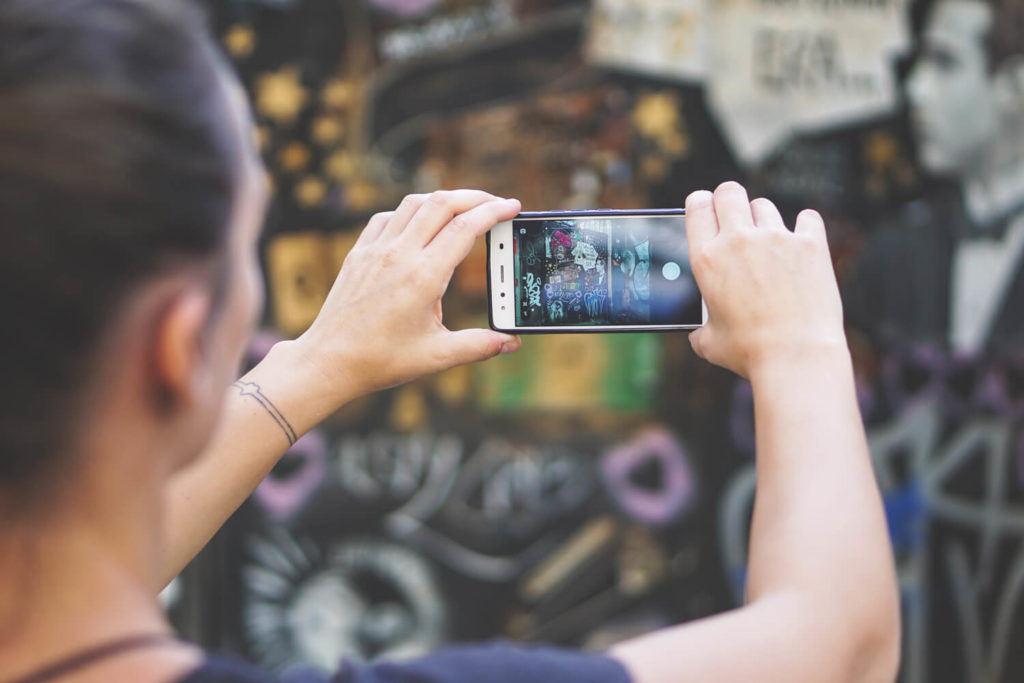
If you’re interested in art, you should visit the Tel Aviv Museum of Art. The museum is open every day except Saturday. You can visit the museum on Mondays, Wednesdays, and Sundays from 10 a.m. to 6 p.m. On Tuesdays and Thursdays it is open from 10 a.m. to 9 p.m.
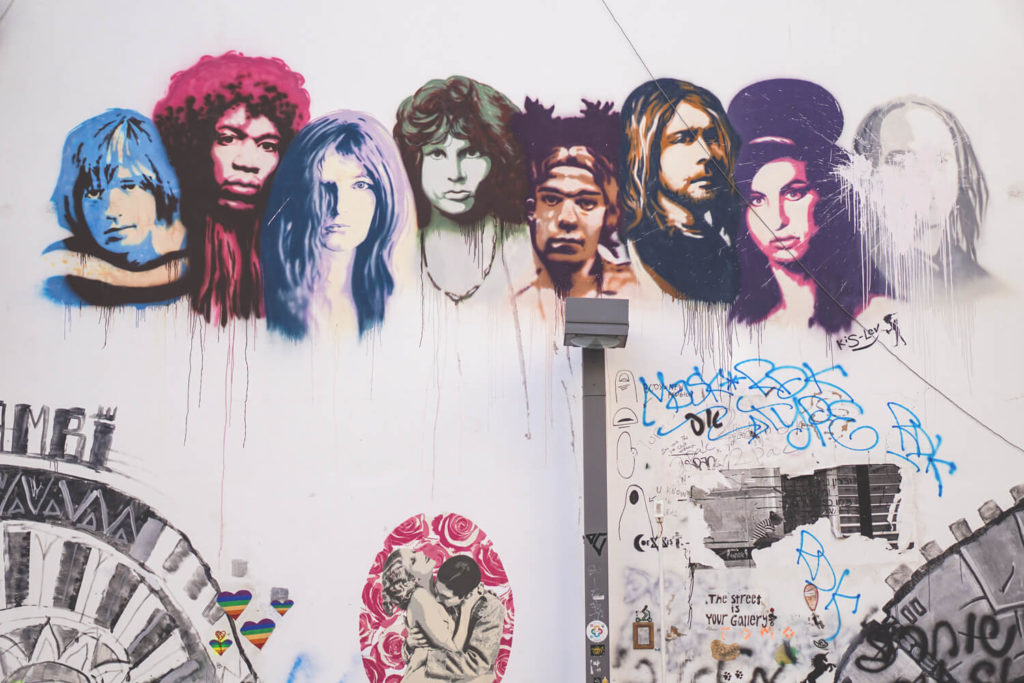
On Fridays the Museum of Art closes at 2 p.m. The entrance fee is 50 shekels, which is about €11.50. Other interesting places: The Helena Rubinstein Pavilion for Contemporary Art, Sommer Contemporary Art, Bauhaus Center, Beit Ha’ir, Meshuna gallery, Alon Segev Gallery, Centre for Contemporary Art (CCA), Art Space TLV, Cartoon Museum in Holon, Holon Institute of Technology & Design Museum and many more. Some of the most popular museums in Tel Aviv are the Palmach Museum, the Yitzhak Rabin Center, Independence Hall, the Ben-Gurion House, and, as already mentioned, the Tel Aviv Museum of Art.
10. Tel Aviv Tips – Sights
Fortunately, there are no huge sights in Tel Aviv like in London, Barcelona, or New York. Tel Aviv is a city in its own right, a metropolis where you can just wander around without feeling rushed. We especially loved the Florentin district with its many bars, cafés, and restaurants, as well as the beautiful Hayarkon Park and the harbor in the north.
The flea market in Old Jaffa is not to be missed, nor is the wonderful beach promenade. You’ll find really cool shops and boutiques everywhere in the streets. Listing the best cafés, restaurants, and shops here is pointless; there are just too many. Just go with the flow and see where you end up. Tel Aviv is exciting and always full of surprises.
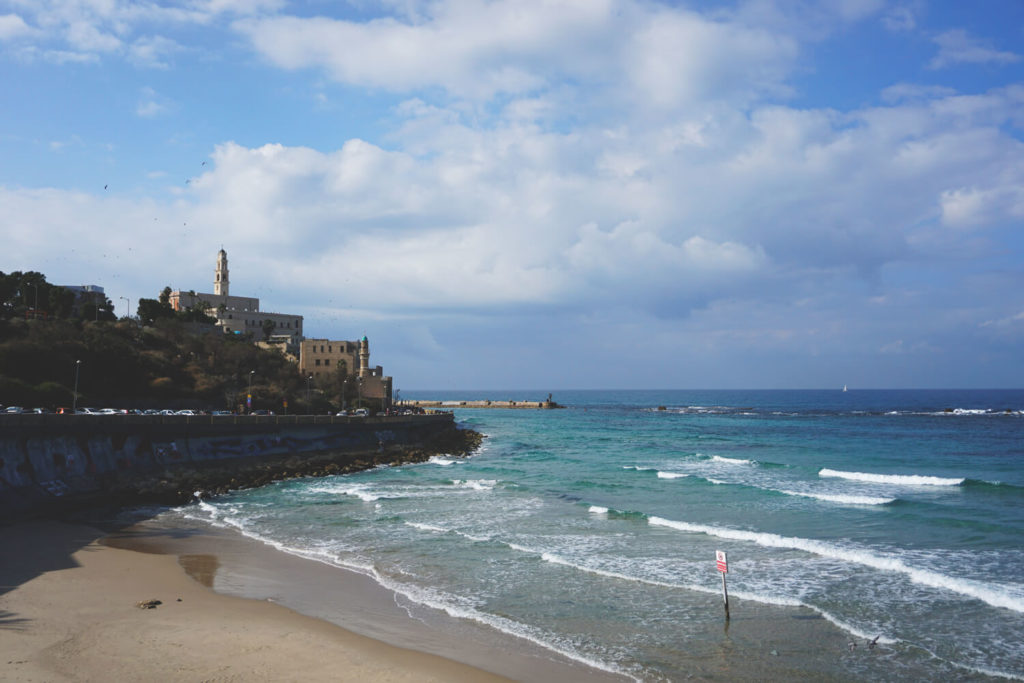
- the old and converted HaTachana train station
- Old Jaffa and the colorful flea market
- Relaxing on the Yarkon River and in Hayarkon Park
- the Sarona Market
- Harbor/marina with street food and cafes
- through the districts of Neve Zedek & Florentin
- The beautiful Rothschild Boulevard is a great place to stroll
- Tourist information on the beach near Jaffa with great information material
- A trip to the Tel Aviv Museum of Art
- Observation deck at the Azrieli Center
- Rent a bike and cruise along the beach
- Sunset on the beach
11. Food and Drink
The food in Tel Aviv is varied, delicious, and multicultural. Kebabs, hummus, shawarma, falafel, and fruit, pastries, and pita bread are the mainstays. Israel is generally a melting pot of different cultures, and so you’ll find a mix of many flavors in the cuisine as well. In our opinion, there is no such thing as typical Israeli cuisine; it’s more of a mixture of East and West, Middle East and Mediterranean.
Typical Israeli specialties include shakshuka, avocados, falafel, Israeli Medjool dates, and hummus. You can enjoy delicious food at the Lewinksy Market, the Jaffa Flea Market, or the popular Carmel Market. All the other travel blogs have talked about the best hummus at Abu Hassam in Old Jaffa. We went there and tried it. To be honest, we didn’t find it particularly special—rather average. You can find hummus that’s at least as good in every other corner of the city.
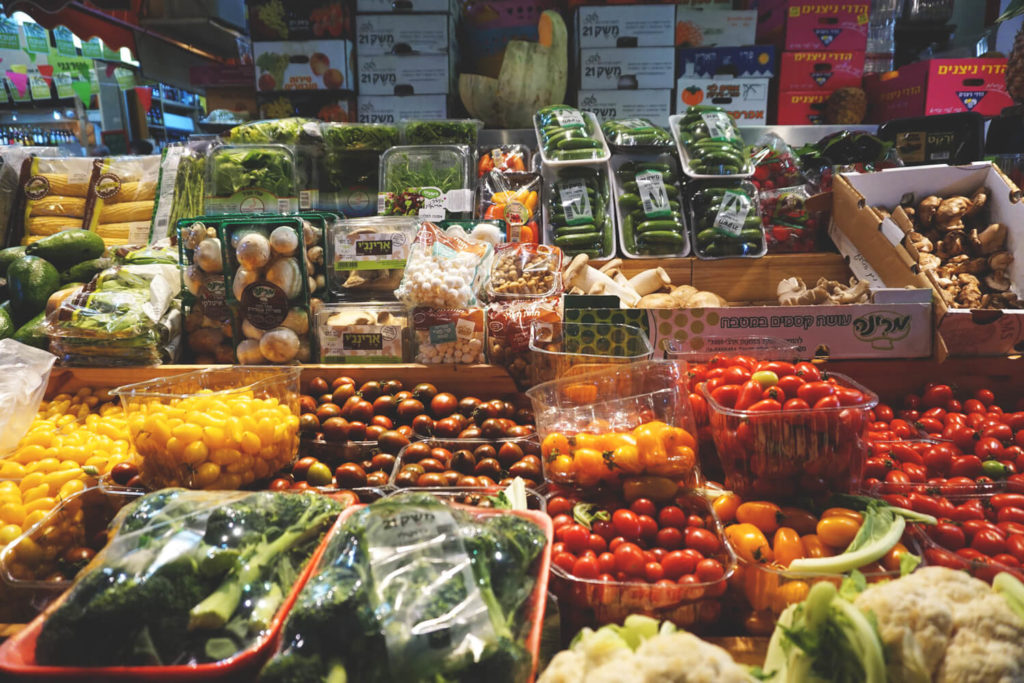
The tap water is drinkable in Israel. In addition to water and the usual soft drinks, you can also get freshly squeezed juices at the stalls. Israel is also known for its really good white and red wines. Fruit and vegetables have a very good reputation in Israel. The harvest arrives at the market stalls immediately after picking, within a few hours.
You’ll find plenty of them at the markets in Tel Aviv. Not only apples, melons, artichokes, and citrus fruits, but also kiwis, mangos, persimmons, loquats, passion fruit, papayas, and cheromoya. Depending on the season, you can also get pomegranates, dates, figs, and giant strawberries.
12. Tel Aviv Tips – Tours
Tel Aviv offers countless tours. For a first impression, the Free Walking Tours are a great option. These take place every day at 11 a.m. and 2 p.m. The meeting point is at the clock tower in Old Jaffa and guides you through Jaffa’s Old City. At the end, you pay as much as you want. We took a similar tour in Jerusalem and highly recommend it. The Tel Aviv City Tour always takes place at 2 p.m., on Wednesdays and Saturdays. You’ll start at the clock tower in Old Jaffa and stroll through the city for around 2.5 hours (street art, trendy district, Bauhaus, and much more). This tour costs around €21.
Many people also take a Bauhaus tour. Tel Aviv isn’t called the “White City” for nothing. You’ll find countless Bauhaus-style buildings in the city. The Bauhaus Centre offers tours that last around 2 hours and cost 80 shekels (€18). CTLV offers a variety of tours, whether graffiti, architecture, or harbor tours.
13. Excursions in the surrounding area
From Tel Aviv, it’s just a stone’s throw to Jerusalem. Egged buses take you to your destination quickly and cheaply. The journey only takes around 45 minutes. There’s so much to discover in Jerusalem; be sure to allow at least a whole day for it. If you have enough time, you should also take a detour to the Dead Sea.
Here, too, you can arrive by bus or book a guided tour. It’s about a two-hour drive to Ein Bokek on the Dead Sea. Also nearby are the beautiful Ein Gedi National Park and the Masada Fortress. You can easily book such day trips on the GetYourGuide* website.

Haifa is only about 80 minutes away by bus. Bus number 910 departs from the central train station every 60 minutes. Here, you can admire, among other things, the beautiful Hanging Gardens. Another highlight in the area is the Ramon Crater. You can easily reach it by car within 2.5 to 3 hours, or you can take the bus via Mitzpe Ramon and Jerusalem.
Many vacationers also make a detour to Nazareth, Bethlehem, Tiberias, Galilee, or even to Caesarea, Jericho, and the City of David. Of course, we haven’t seen every corner of Israel, but there are certainly many exciting tours in the surrounding area. A day trip south to Eilat isn’t really worth it due to the distance, but you might still have time to visit this region. Not only is the beautiful Red Sea located here, but also the Red Canyon and the border with Jordan and Sinai/Egypt. Our conclusion about Tel Aviv: Tel Aviv is a fantastic city, which we loved from the very beginning. We’re incredibly keen to travel back to Tel Aviv soon to explore other areas. During our tour of Israel, we truly learned to appreciate the country and its people. We can only recommend a trip to this country to everyone; it’s incredibly fun. Why is Tel Aviv now our new number 1 city? Almost everything is just right here: the climate is super pleasant, the beaches and the sea are fantastic, the food is delicious, the people here are cool, the city is diverse, modern, and cultural, and you can also surf in Tel Aviv! Oh yeah, and you can reach Tel Aviv in just 4 hours by plane, so you don’t have to fly halfway around the world.